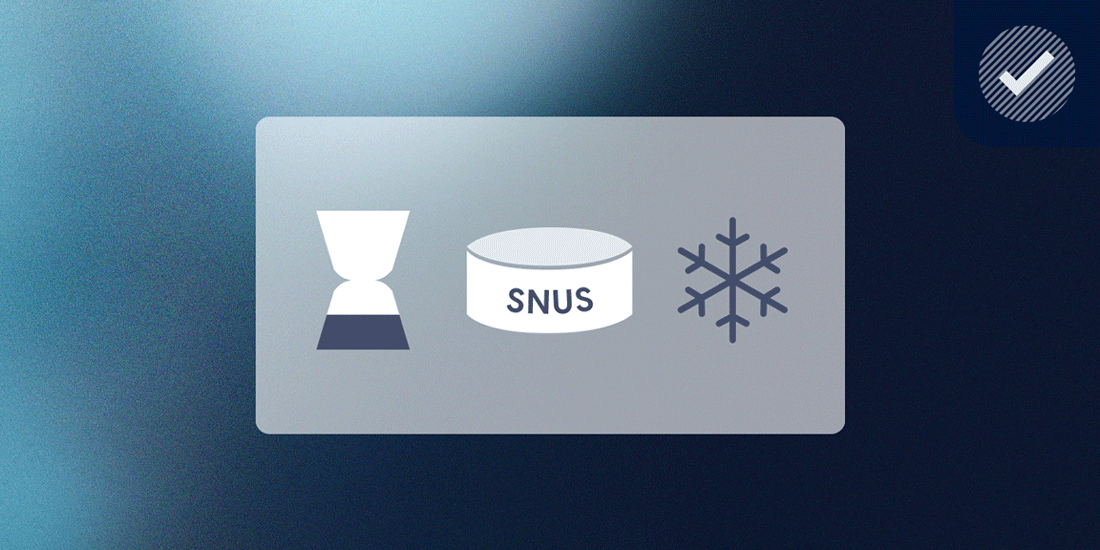By storing your snus properly, you can keep it fresh for longer. Always store your products in a cool place (4-8°C), keep already opened snus cans in an airtight container—zip bags or other airtight packaging are particularly suitable—and make sure to store them in a place protected from light. If you follow these three factors, your snus products should stay fresh for longer.
Incorrect storage of Snus and nicotine pouches carries the risk of a considerable loss of quality - in terms of flavor, but also in terms of effect. But what needs to be considered during storage? Also: How long is Snus durable and why is there a best-before date on the cans? Below we explain and summarize the most important facts.
Snus Best before date
Have you ever wondered why Snus have a best-before date on the cans? A look at Sweden shows that products there are subject to the Food Act and the Food Ordinance, among other things. In a document from the Swedish Food Agency on "New regulations for Snus, snus-similar products and chewing tobacco" it is stated that:
"In Sweden there are provisions on Snus and chewing tobacco [...][...] Section 3 of the Foodstuffs Act states that Snus and chewing tobacco are treated as food within the meaning of the Foodstuffs Act."
Not only do strict quality standards apply to production, but the obligation to declare a best-before date, as regulated in the European Food Information Regulation (EU) No. 1169/2011, also applies. This is supplemented by the following:
"From January 1, 2023, also snus-similar products will also be treated as food under the Foodstuffs Act."
For tobacco-free nicotine pouches it is therefore also mandatory to indicate the best-before date. Such a label can be found on the bottom of the cans, and the shelf life is usually given as one year from the production date.
In Germany and Austria, for example, such products are also subject to the Foodstuffs Act, which requires the same information.
Can Snus expire?
The information on shelf life is a best-before date - not a use-by date or expiry date. This is usually marked with "BB" - which means "best before". The Snus-products can therefore still be consumed after the specified date without any health risk. However, the taste and effect may have changed or deteriorated, which could at least have been delayed or contained by proper storage.
Optimal storage conditions for Snus and nicotine pouches
For the Snus several factors play a role in shelf life, but correct storage is essential to maintain quality and freshness for longer. In any case, early drying out should be prevented, as this has the greatest impact on the taste and effect. To ensure this, you should consider the following points during storage:
- Store in a cool place: Keep Snus in the refrigerator. The cool temperatures prevent them from drying out too quickly. The moisture and flavors of the Pouches are thus preserved for longer. A temperature of around 4-8 °C is ideal.
- Seal airtight: Always keep the packaging tightly closed to prevent it from drying out. If the original packaging is damaged, the Pouches can be repacked in airtight containers.
- Store away from light: Direct and excessive exposure to light reduces quality retention. This is usually noticeable in the taste - but the texture of the Pouches can also be negatively affected. It is therefore advantageous to store them away from light, which is guaranteed in the fridge anyway.
When you order snus from Snuzone, you have the advantage that the products are always fresh:
Should Snus be stored in the refrigerator?
The Swedes know how to store their beloved trendy tobacco properly. In most of the establishments, who sell Snus and nicotine pouches there, the products are stored in refrigerated units - because they stay moist and fresh for longer and the quality does not deteriorate. In addition, cool storage can counteract the natural ageing processes, especially of tobacco.
Many well-known manufacturers of nicotine pouches recommend storing them in the refrigerator - especially if the cans have already been opened. Some users also speak of a better and fresher consumption experience if the nicotine pouches are consumed chilled.
Can you freeze the Snus?
It´s possible and especially recommended for longer storage periods. However, you should consider the following to avoid being surprised by undesirable effects at the end: Pack the cans - especially if they have already been opened - in Ziplock Pouches or correspondingly airtight containers. Otherwise the extreme cold, the temperature fluctuations that occur every time the freezer compartment is opened and the no-frost function, which is common in modern freezers, dehumidify it inside the freezer. The airtight packaging protects your Snus-products from drying out.
When the Snus-products have been frozen and then defrosted, you should avoid refreezing them - the taste and moisture content otherwise will get worse.










